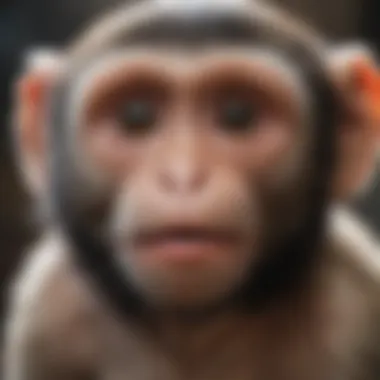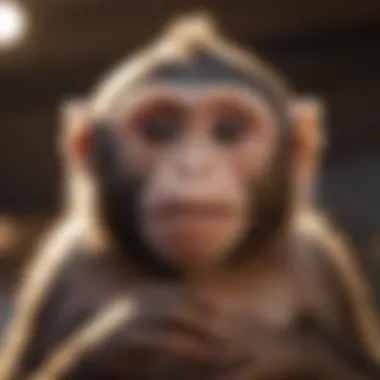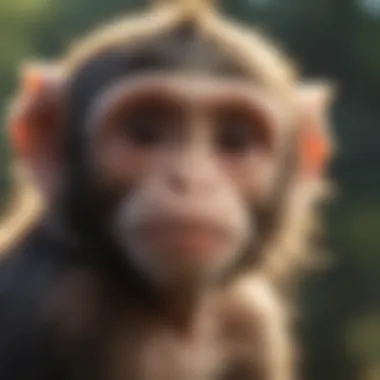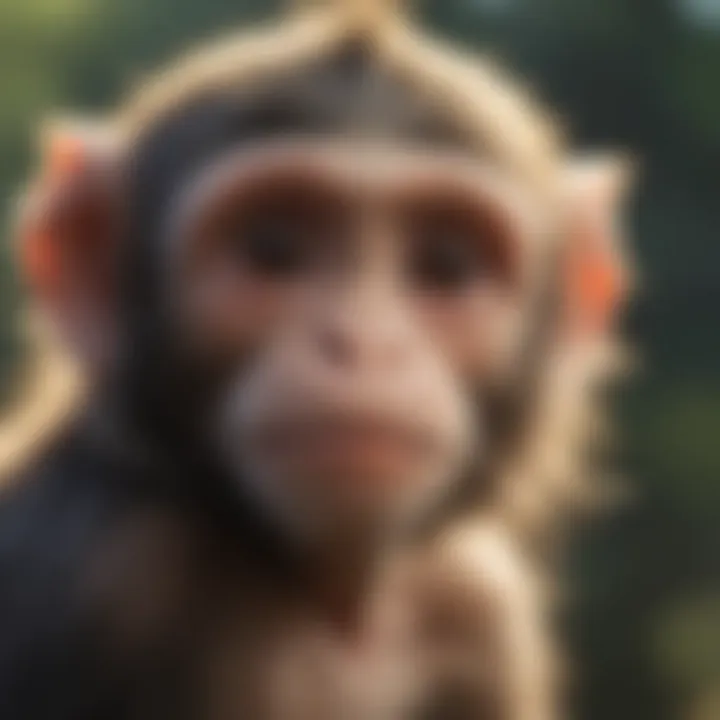Understanding the Price of a Pet Monkey


Intro
The concept of owning a pet monkey may seem attractive to some, but it is crucial to understand the implications attached to this decision. For many, the idea of having such a unique animal companion brings up excitement and curiosity. However, the complexities surrounding ownership can be daunting. Therefore, this article aims to unpack these elements, giving potential owners a clear view of what financial responsibilities and ethical concerns they will face.
Animal Overview
While the notion of a pet monkey is alluring, it's essential to first grasp what this entails biologically and ecologically. Here, we consider common names, scientific classification, and their geographic range.
Common Names
Monkeys are diverse, with various species often referred to as monkeys in casual conversation. Some popular ones include the capuchin monkey, macaque, and squirrel monkey.
Scientific Classification
Scientifically, monkeys fall under the order Primates. They can be divided into two main groups: New World monkeys and Old World monkeys. Each group contains various families and species, which differentiate them by physical characteristics and behavior.
Geographic Range
The geographic range of monkeys is broad. New World monkeys inhabit Central and South America, whereas Old World monkeys are primarily found in Africa and Asia. Understanding their native habitats is crucial when considering their care and needs in a domestic environment.
Behavior and Social Structure
Ownership entails more than financial responsibility; understanding monkey behavior and social structure is fundamental.
Social Behavior
Monkeys are inherently social animals. In the wild, they live in groups, showcasing intricate social dynamics. This aspect of their behavior suggests that an individual monkey in a domestic setting may suffer from loneliness and stress without companionship.
Communication
Their communication is multifaceted, including vocalizations, gestures, and facial expressions. Each species has its unique sounds and ways to convey emotions and warnings, influencing training and social interactions with humans.
Mating and Reproduction
Monkeys typically have specific mating seasons, and their reproductive behaviors can be complex. For owners, it is important to contemplate the responsibilities that come with breeding, such as caring for young and managing familial bonds within the household.
Habitat and Ecosystem
To appreciate the costs involved in ownership, it's essential to evaluate the natural habitats and roles of monkeys in their ecosystems.
Natural Habitat
Monkeys thrive in various environments, from tropical rainforests to savannas. Their habitats greatly influence their physical and psychological well-being, necessitating similar conditions in captivity.
Food Sources and Diet
A proper diet is paramount for a monkey's health, which consists of fruits, leaves, insects, and small animals. Replicating their natural diet can be costly and labor-intensive.
Role in Ecosystem
Monkeys play critical roles in their ecosystems as seed dispersers and as part of the food web. Understanding their ecological significance can enhance awareness of why ethical ownership is necessary.
"Owning a pet monkey is not just about the initial cost; it's about ongoing expenses and ethical responsibilities."
With these foundational insights, we can now delve deeper into specific costs associated with pet monkey ownership. Considering factors such as initial purchase price, maintenance, and legal aspects will frame our understanding more comprehensively.
The Basics of Pet Monkeys
Understanding the fundamentals of pet monkeys is essential for anyone considering bringing one of these animals into their home. The appeal of pet monkeys often stems from their remarkable intelligence and social nature. However, potential owners need to grasp both the responsibilities and the costs associated with their care. This section provides a foundational understanding that helps prospective owners make informed decisions. It is also a prelude to deeper discussions on financial implications, legal frameworks, and ethical considerations surrounding pet monkeys.
Defining Pet Monkeys


Pet monkeys refer to small primates kept as companions rather than for commercial, research, or educational purposes. While the term can be broad, it primarily includes species that are often adopted into homes. Keeping a monkey as a pet is not simply about companionship; it is an intricate commitment that spans their entire lives, often 15 years or more. Owners must recognize that these animals are not domesticated pets like dogs or cats, but rather wild animals requiring significant understanding and care. Awareness of their natural behavior, social structures, and specific needs is crucial for ensuring their proper welfare.
Popular Species of Pet Monkeys
Several species of monkeys are favored by those interested in exotic pets. Each species comes with unique characteristics and requirements, influencing their popularity in the pet trade. Understanding these species helps in making educated decisions about ownership.
Capuchin Monkeys
Capuchin monkeys are known for their intelligent and agile nature. They are often featured in films and television, which has contributed to their popularity as pets. The main characteristic of capuchin monkeys is their highly social behavior; they thrive in groups and require regular interaction to maintain their well-being. This species is often family-oriented and can form strong bonds with their human caregivers. However, their need for companionship can pose challenges, as they may suffer from separation anxiety if left alone for extended periods. Additionally, they require ample space to climb and engage in natural behaviors.
Squirrel Monkeys
Squirrel monkeys are smaller and known for their playful demeanor. They are highly energetic, requiring substantial mental and physical stimulation. One of their key features is their intelligence, which makes them trainable but also requires an experienced owner who can channel their energy positively. Squirrel monkeys can adapt well to family environments if socialized properly from a young age. However, owners must ensure they provide a stimulating environment; neglecting their needs can lead to behavioral issues. Their intricate needs make them a less popular choice for novice pet owners.
Marmosets
Marmosets are among the smallest pet monkeys and are often favored for their diminutive size and captivating personality. Their sociability and playful behavior attract potential owners. Marmosets require a specialized diet that includes fruits, insects, and specially formulated primate food. This diet can be an added cost for owners. They can bond closely with their human companions, but they also have specific needs for space and stimulation. The unique temperament of marmosets requires a commitment from their owners to provide adequate social interaction and environmental enrichment.
Initial Costs of Purchasing a Monkey
The initial costs associated with acquiring a pet monkey are both substantial and multifaceted. Understanding these expenses is crucial for any potential owner. These costs encompass not only the purchase price of the monkey but also necessary preparations to ensure a safe and suitable environment. Many people are drawn to the exotic appeal of pet monkeys, yet often overlook the financial realities involved in their care. Investing in a monkey is not just a transaction; it involves committing to a long-term responsibility with varying demands.
Factors Affecting Price
Species rarity
The rarity of a monkey species plays a significant role in determining its price. More uncommon species are often priced at the higher end of the spectrum. For example, the Capuchin monkey is more readily available compared to the endangered Squirrel monkey. Its popularity makes it a preferred choice among potential owners, which can affect its market value. The unique feature of species rarity often leads to ethical implications, particularly regarding conservation. Buyers opting for rarer species may contribute to unsustainable practices in the pet trade. Thus, while species rarity can enhance a monkey's allure, it raises important considerations regarding its long-term effects on existence.
Age
The age of a monkey significantly affects its purchasing price as well. Younger monkeys, particularly infants, are usually more expensive because they require intensive care and socialization. Many owners desire these youthful companions, seeking to raise and bond with them from an early stage. However, older monkeys may also be appealing due to their more established behaviors. Each age group presents both advantages and disadvantages. While buying a young monkey can promise years of companionship, it also demands more time and patience for training and social adaptation, increasing initial costs beyond the purchase price alone.
Breeder reputation
The reputation of the breeder is another critical factor influencing the price of pet monkeys. Reliable and recognized breeders often charge more, reflecting the quality of care and breeding practices. A reputable breeder ensures healthy animals and proper documentation, which can lead to higher upfront investment. Conversely, lower prices from less established breeders may hint at ethical concerns or health risks. Thus, selecting a breeder should include assessing their integrity and practices, ensuring an investment in both quality and the well-being of the monkey.
Average Prices by Species
Typical cost ranges
Typical price ranges for pet monkeys vary significantly based on species and breeder. For instance, the Price for a Capuchin monkey can range from $5,000 to $15,000, depending on its origin and breeder. Marmosets often fall in a similar range but may also command higher prices for rare colors. Understanding these typical cost ranges can serve as a purchasing guideline, helping prospective owners gauge realistic budgets before committing to the ownership.
Variability based on location
The location also plays a crucial role in the price of pet monkeys. Prices may fluctuate based on regional demand, availability of breeders, and local laws governing pet ownership. For example, in urban areas where exotic pets are sought, prices may soar compared to rural regions. This spatial variability highlights the importance of research before making a purchasing decision. Owners must acknowledge local conditions and regulations that could affect both the accessibility and overall ownership costs.
Ongoing Costs of Monkey Ownership
Understanding the ongoing costs of monkey ownership is crucial for anyone considering bringing one of these unique creatures into their home. Beyond the initial purchase price, future expenses accumulate in various areas. Pet monkeys have specific needs that demand sustained financial commitments. Owners must be prepared for these ongoing responsibilities to ensure their monkey remains healthy and happy.
Healthcare and Veterinary Expenses
The health of a pet monkey is paramount. Regular veterinary care ensures prevention and early detection of health issues. Pet monkeys, like any pets, require routine check-ups.
Routine check-ups
Routine check-ups are an essential aspect of maintaining a monkey's health. Unlike dogs or cats, monkeys might have different health indicators and required examinations. Regular visits allow veterinarians to monitor their growth, develop vaccination schedules, and catch any early signs of illness. This proactive approach significantly contributes to the longevity of the pet's life. The unique feature of these check-ups lies in the specific health assessments that target the needs of each monkey species. Owners who prioritize routine check-ups can potentially avoid costly emergency health expenses later.
Emergency care
Emergency care is another vital component of ongoing costs. Accidents can happen, and monkeys can become ill without warning. Immediate access to veterinary services is critical. Emergency care often involves higher costs compared to routine visits due to the nature of the service. Unforeseen circumstances can lead to significant financial strain if not budgeted in advance. Owners should understand that having a financial plan for unexpected emergencies is crucial for responsible ownership.


Vaccinations
Vaccinations are necessary to prevent diseases that could be life-threatening to monkeys. Depending on the species, vaccinations may vary, and some monkeys might require additional doses for certain illnesses. Staying up-to-date on vaccinations ensures that the pet is not only protected but also less likely to spread diseases to humans and other animals. This ongoing cost helps highlight the importance of preventive veterinary care as part of a responsible ownership approach.
Diet and Nutrition Needs
Feeding a pet monkey is also a recurring cost that should not be overlooked. Monkeys have distinct dietary needs that must be met to ensure their health and happiness.
Species-specific diets
Species-specific diets are critical when it comes to ensuring a monkey's well-being. Every species has unique nutritional requirements that come from a variety of food sources. For example, some monkeys might thrive on fruits and insects, while others require a diet richer in protein. Understanding these requirements and sourcing the right types of food can often require research and commitment. Failure to provide the right diet could lead to health problems in the long run.
Costs of specialized food
Costs associated with specialized food can add up quickly. Unlike typical pet food, many diets for monkeys involve high-quality, fresh ingredients or even supplements. Ensuring that pet monkeys receive their necessary nutrients can translate to higher grocery bills. Additionally, depending on the location, sourcing specific foods may become difficult or expensive. This budgeting aspect is critical for potential owners to consider when thinking about ongoing expenses.
Legal Regulations and Costs
Understanding the legal framework surrounding pet monkey ownership is crucial for anyone considering bringing one of these unique animals into their lives. This aspect not only affects the financial commitment but also speaks to the ethical and responsible ownership of such animals. Without adherence to legal regulations, potential owners can face hefty fines or even the confiscation of their pet. Moreover, regulations ensure the welfare of the monkeys and contribute to broader conservation efforts.
Legality of Ownership
State and Federal Regulations
The legality of owning a pet monkey varies dramatically across different regions. In some areas, ownership is completely banned, while in others, it may be legal with specific restrictions. Understanding the landscape of state and federal regulations is essential for potential owners.
Key characteristics of these regulations include:
- State-specific Legislation: Each state can set its own laws regarding exotic pet ownership. Some states completely prohibit pet monkeys, while others require permits.
- Federal Regulations: The U.S. federal government imposes regulations aimed at protecting endangered species. This can affect certain monkey species, making ownership illegal or demanding stricter oversight.
The benefit of these regulations lies in their role in protecting both the animals and their potential owners. They help ensure that monkeys are kept in environments that meet their social and physical needs, while also preventing illegal wildlife trade. However, the downside may include a maze of legalities that potential owners must navigate, which can be complicated and time-consuming.
Permits and Licenses
Permits and licenses are often mandatory when considering pet monkeys. These documents provide a level of accountability and ensure that the owner understands the responsibilities involved in caring for such a species.
The key aspects of permits and licenses are:
- Application Processes: Each state may have its own process for applying for permits. Some may require background checks or proof of appropriate housing for the monkey.
- Cost Implications: Obtaining these permits can add an additional financial burden on top of the purchase price of the monkey itself.
While obtaining a permit demonstrates a serious commitment to responsible ownership, it can also deter some potential owners who may find the process overwhelming or expensive. Furthermore, without these permits, ownership could lead to legal trouble.
In summary, understanding legal regulations and the necessary permits is a significant step for anyone interested in owning a pet monkey. This knowledge not only helps in making informed decisions but also emphasizes the importance of responsible ownership and animal welfare.
"Regulations are not just hurdles; they are essential guidelines that ensure the well-being of both the owner and the pet."
For more on the legal aspects of exotic pet ownership, visit Wikipedia or check discussions on Reddit.
Ensure that compliance with all regulations is a top priority to avoid future challenges.
Ethical Considerations in Ownership
Ethical considerations are crucial when contemplating pet ownership, especially for exotic animals like monkeys. Understanding these aspects helps potential owners to weigh the implications of bringing a monkey into their home. Considering animal welfare and environmental impact is vital in making an informed decision about pet ownership.
Welfare of the Monkey
Social needs
Social needs are a fundamental aspect of monkey welfare. Monkeys are inherently social creatures, requiring interaction with their kind for emotional health. In the wild, they live in groups, forming strong social bonds. When kept alone, monkeys may face issues such as depression or behavioral problems. This makes it essential for owners to consider having more than one monkey or providing ample social interaction through regular engagement.
A key characteristic of social needs lies in its direct relation to a monkey’s overall happiness. For example, interaction with other monkeys can reduce stress and anxiety. Conversely, isolation might lead to destructive behaviors. One unique feature of addressing social needs is the potential for enrichment, which can enhance the quality of life for pet monkeys. However, meeting these needs can be challenging for single owners with limited time.


Environment for well-being
The environment plays a significant role in the well-being of pet monkeys. A suitable living space mimics their natural habitat, allowing monkeys to express instinctual behaviors. Factors like climbing structures, safe toys, and adequate space are important in providing an enriching environment.
A key characteristic of the environment for well-being is the amount of mental and physical stimulation it offers. A well-designed space promotes exploration and play, which are crucial for a monkey’s health. Lack of proper environment can lead to boredom and stress. A unique feature of this aspect is that an enriched environment can help minimize health issues associated with captivity. However, setting up such an environment can require significant effort and financial investment.
Impact on Natural Habitats
Conservation implications
The conservation implications of keeping pet monkeys are substantial. When demand for exotic pets rises, it can lead to increased poaching and habitat destruction. This not only threatens monkey populations but also disrupts entire ecosystems. Understanding these conservation implications fosters a greater appreciation for the species and the need to protect their natural habitats.
One key characteristic of conservation implications revolves around sustainable practices. Educating potential owners about the need for ethical sourcing and adopting monkeys from reputable breeders instead of the wild is essential. A unique aspect of this discussion is how fostering responsible ownership can assist in conservation efforts. On the downside, it may deter some individuals due to the perceived difficulties in finding ethically sourced animals.
Role of pet trade
The role of pet trade cannot be overlooked when discussing ethical ownership of monkeys. The legitimate trade can sometimes provide financial support for conservation initiatives. However, the unregulated aspects contribute heavily to animal suffering and ecological damage. By understanding this role, potential owners can better navigate their decisions about monkey ownership.
The key characteristic of this role is the dual nature of the trade, where benefits and harms coexist. On one side, informed pet ownership can lead to increased awareness and funds for conservation. On the other, irresponsible trade practices create a cycle of abuse. A unique feature here is that advocating for ethical treatment and sourcing can positively influence the broader market. Unfortunately, not every owner may prioritize this consideration, leading to continued issues within the pet trade.
In summary, ethical considerations surrounding monkey ownership demand careful thought. A thorough understanding of welfare, environmental needs, conservation implications, and the implications of the pet trade is necessary for responsible ownership.
Alternatives to Pet Monkeys
Considering a pet monkey as a companion comes with a range of implications that potential owners should understand. While pet monkeys can be appealing, alternatives may provide similar companionship without the complex demands involved in monkey ownership. Exploring these options is essential for those seeking to enhance their lives with pets while navigating the legal and ethical complexities associated with primate ownership.
Potential Companion Animals
Other exotic pets
Exotic pets encompass a variety of species that are not typically categorized as traditional household animals. These include reptiles, birds, and small mammals like hedgehogs or ferrets. Each of these animals brings unique characteristics. For example, reptiles, like bearded dragons, require specific habitats and diets, making them both exotic and fascinating. They demand relatively lower maintenance compared to monkeys, which always need social interaction and specific environments.
The key benefit of choosing exotic pets lies in their uniqueness and low maintenance level. Other exotic pets tend to be less demanding in terms of social and physical needs. Still, potential owners must consider that some exotic species have particular legal restrictions depending on where one lives.
- Advantages:
- Disadvantages:
- Require less social interaction than monkeys.
- Often have lower long-term costs once initial setups are complete.
- Some species may require intricate habitat setups.
- Less social engagement can lead to boredom for the owner, diminishing the companionship experience.
Traditional pets
Traditional pets, such as dogs and cats, are well-known for their companionship and loyalty. Dogs, in particular, offer an unconditional bond with their owners and can be easily trained for various tasks and commands. They are highly sociable animals and thrive on human interaction.
The core advantage of traditional pets is their broad availability and established support systems. Many resources, including veterinarians and trainers, exist to assist owners in providing care. Additionally, cats and dogs have a variety of breeds to choose from, allowing owners to select according to their lifestyle needs and preferences.
- Advantages:
- Disadvantages:
- Well-understood behavior and needs by society.
- Can provide extensive emotional support and companionship.
- Require significant time investment, especially dogs.
- Costs can accumulate with healthcare, food, and other essentials.
When considering the idea of alternative pets, reflect on the level of commitment, time, and resources available. This will direct you toward finding a companion that aligns with your lifestyle without the challenges monkeys may present.
Remember, the choice of a pet can impact both your life and the life of the animal. It is prudent to explore all options thoroughly before making a decision.
Ending: Weighing the Costs and Benefits
The decision to own a pet monkey represents a significant commitment, encompassing both financial and emotional investment. In this article, numerous aspects have been discussed regarding pet monkey ownership, from initial prices to ongoing costs and ethical considerations. Understanding these factors is critical for anyone contemplating bringing one of these highly intelligent animals into their lives.
For potential owners, it is important to engage in a thorough assessment of personal capabilities and lifestyle suitability. While some might be enticed by the unique experience of having a monkey as a pet, the reality of their care can be complex. This care goes beyond basic needs and includes emotional welfare and social engagement.
Final Considerations for Potential Owners
When contemplating pet monkey ownership, it is crucial to factor in the following elements:
- Time Commitment: Monkeys require significant interaction and socialization. They can become stressed and develop behavioral issues if left alone for long periods.
- Legal Compliance: Understanding local laws and regulations regarding monkey ownership is essential. Some regions have strict regulations or outright bans.
- Financial Preparedness: Factors such as veterinary care, specialized diets, and habitat needs can add up quickly. A deep understanding of ongoing expenses will aid in making an informed decision.
- Impact on Quality of Life: Reflecting on the potential disruption to personal life and household dynamics is necessary. Monkeys are not like traditional pets; they have complex social needs and can be demanding.
Ultimately, the decision to own a pet monkey should be based on a realistic understanding of responsibilities involved. Both the joys and challenges of ownership must be acknowledged in order to promote the well-being of the animal. Hence, it is vital to weigh not just the price but the profound implications of their care before making a decision.







